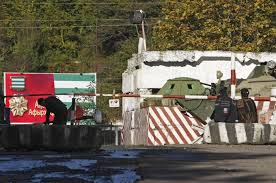
Russia Moves ‘Border Zone’ Seven Miles Deeper Into Breakaway Abkhazia
Publication: Eurasia Daily Monitor Volume: 11 Issue: 25
By:

On January 20, Abkhazia’s separatist government moved its so-called “border zone” with Russia almost seven miles (11 kilometers) deeper into Abkhazia. The measure is designed to widen the security area around the city of Sochi and tighten safety measures ahead of the Olympic Games (civil.ge, January 20). Moscow made it appear as if the Abkhazian regime moved the “border zone” on its own initiative. Needless to say, the separatists would not have shifted the border without Moscow’s direct request. Such servility once again underscores Moscow’s direct influence over the Abkhazian regime, which has no more powers than a regional administration of any Russian province, such as Stavropol, Krasnodar or Pskov.
Furthermore, moving the border line seven miles deeper into breakaway Abkhazia reveals the widespread paranoia in the Kremlin about the security situation around the Sochi Winter Olympics site. Sochi is already located 25 miles (about 40 kilometers) away from the border. Moving the frontier seven miles further away certainly will have little impact on strengthening safety measures. Nevertheless, Moscow still shifted the boundary back.
Russian Regnum News Agency claimed that the security measures in the expanded border zone would be overseen by local Abkhazian forces (regnum.ru, January 20). However, it seems improbable that Moscow would trust the Abkhazian forces to guard the movement of people and transport within this sensitive zone. More likely, Russian special forces or the military already stationed in the region will assume control of the entire border zone area.
The act of moving the border has further implication besides just highlighting the Abkhazian regime’s servility to Moscow or the Kremlin’s feverish attempts to ensure security at the Sochi Olympics. In particular, shifting the border zone underscores several troubling points in the Russian-Georgian relationship. First, the expanded border zone security regime will reportedly remain in force until March 21—a month after the end of the Winter Olympics and a week after the close of the Paralympic Games (topnews.mediamall.ge, January 20). And with Russia’s recent history of gradually annexing additional Georgian lands around the occupied region of South Ossetia (EDM, September 23, 2013), it remains to be seen if, following March 21, the redrawn border with Abkhazia will be reverted to its prior position. Currently, eight towns are located within the expanded border zone, which stretches from the Psou River to the village of Bagripshi (topnews.mediamall.ge, January 20).
Moreover, Moscow never notified Tbilisi that Russia intended to move the border—a clear message meant to emphasize that the Kremlin does not consider Abkhazia to be a part of Georgia and that Moscow’s interests in the occupied region are non-negotiable. Such an uncompromising stand puts into question the rationale for the new Georgian government’s rapprochement with Russia. So far, Tbilisi has not achieved anything in its bilateral relations except the reopening of the Russian market for Georgian agricultural products (see EDM, April 4, 2013; January 10, 2014).
The Georgian Ministry of Foreign Affairs condemned the extension of the security zone, calling it an illegal action, which violates Georgia’s territorial integrity and sovereignty (Imedi TV, Channel 1, January 21). Moreover, the Georgian delegation to the Organization for Security and Cooperation in Europe (OSCE) appealed for help. As a result, representatives of the United States and the European Union criticized Russia’s actions (regnum.ru, January 21). Yet, Moscow rarely alters its actions in response to verbal criticism. If the West truly wishes to stop Moscow’s constant violations of Georgia’s state borders, it will need to find more effective ways to deal with Russia.
Meanwhile, Georgia’s new prime minister, Irakli Garibashvili, has been even more timid toward the Kremlin. On February 1, Garibashvili reiterated his government’s readiness to cooperate with Moscow in security for the Sochi Olympic Games, falling short of condemning the expansion of the border zone (info.ge, February 2). Consequently, the Georgian prime minister drew praise from the Russian side for his benign tone toward Moscow (civil.ge, February 2), regardless of the latter’s aggressive behavior.
The new Georgian government often boasts that it has managed to lower tensions with Moscow. Nevertheless, the recent developments surrounding the Abkhazian border zone (as well Russia’s earlier expansions of the South Ossetian occupation line) show that tensions have not gone away. And although the Georgian government desperately tries to downplay these tensions and to portray Georgian-Russian negotiations as yielding concrete results, in reality, the bilateral talks have already hit a brick wall. The government cannot even point to minor progress in solving the problem of the occupied regions. Moreover, the expansion of the border zone in breakaway Abkhazia once again demonstrates Russia’s complete disregard for Georgia’s territorial integrity and sovereignty. It seems that preparations for the Sochi Olympics have not turned out well for Georgia. And it is yet to be seen what awaits the country after the Olympics are over.




